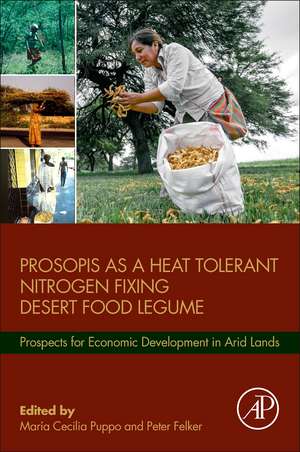Prosopis as a Heat Tolerant Nitrogen Fixing Desert Food Legume: Prospects for Economic Development in Arid Lands
Editat de Maria Cecilia Puppo, Peter Felkeren Limba Engleză Paperback – 9 dec 2021
The legume family (Fabaceae) contains many genera and species that through their nitrogen fixing process provide high protein food and feed for humans and animals. As evidenced by its presence in Death Valley, California, which holds the record for the highest temperatures in the world, these types of plants can thrive in extreme environments.
- Edited by the world’s leading experts on Prospis species with globally recognized contributors
- Covers the different perspectives surrounding the advantages and disadvantages of planting different Prosopis species
- Discusses the applications of Prosopis species, including how the fruits of this tree can be used as a raw food material
Preț: 801.13 lei
Preț vechi: 1046.67 lei
-23% Nou
Puncte Express: 1202
Preț estimativ în valută:
153.31€ • 157.01$ • 127.53£
153.31€ • 157.01$ • 127.53£
Carte tipărită la comandă
Livrare economică 11-25 martie
Preluare comenzi: 021 569.72.76
Specificații
ISBN-13: 9780128233207
ISBN-10: 0128233206
Pagini: 374
Ilustrații: 100 illustrations (60 in full color)
Dimensiuni: 191 x 235 x 23 mm
Greutate: 0.74 kg
Editura: ELSEVIER SCIENCE
ISBN-10: 0128233206
Pagini: 374
Ilustrații: 100 illustrations (60 in full color)
Dimensiuni: 191 x 235 x 23 mm
Greutate: 0.74 kg
Editura: ELSEVIER SCIENCE
Cuprins
1. Prosopis: An empowering forest resource in the service of science for humanity
2. Arid zones, soil carbon, nitrogen fixing trees, ecosystem instability, economic volatility and political turbulence
3. Role of prosopis in reclamation of salt affected soils and soil fertility improvement
4. Prosopis as a weed. Causes and mediation techniques for weed control in developing countries
5. Management and Control of the invasive Prosopis juliflora tree species in Africa with a focus on Kenya
6. The Evolution of Prosopis Management in Haiti
7. Prosopis in the history of the coast of Peru
8. Ethnobotany of Prosopis spp., past evidence of the fruit use and experimental archaeology applied to the interpretation of ancient food processing
9. Genetic improvement in Prosopis
10. Biotechnology and bioprospecting of Prosopis alpataco from Patagonia, Argentina
11. Utilization of Prosopis in the Horn of Africa - recent developments
12. Management, use and control of Prosopis in Yemen
13. Fine Wood, architectural components and furniture from Prosopis
14. Paradigm shift in Prosopis juliflora use through community participation by developing value chain of value-added products from pods
15. Food Safety issues and mitigation of Prosopis flour
16. Peruvian Prosopis pallida: its potential to provide human and livestock food for tropical arid lands of the world
17. Regional traditional foods from Prosopis spp. of the northwest of Argentina
18. Omic sciences for analysis of different Prosopis species
19. Prosopis alba mesocarp flour: a source of functional ingredients
20. Prosopis alba seed flour: a source of bioactive phenolic and proteins
21. Chemical and nutritional composition of Prosopis spp. seeds and pods
22. Galactomannans from different Prosopis species: extraction, characterization and applications
23. Genetic variation in flavor of Prosopis mesocarp flours
24. Foods with Prosopis spp. flour: common and new baked products
25. "Aloja": a pre-Hispanic fermented beverage from Prosopis alba pods
2. Arid zones, soil carbon, nitrogen fixing trees, ecosystem instability, economic volatility and political turbulence
3. Role of prosopis in reclamation of salt affected soils and soil fertility improvement
4. Prosopis as a weed. Causes and mediation techniques for weed control in developing countries
5. Management and Control of the invasive Prosopis juliflora tree species in Africa with a focus on Kenya
6. The Evolution of Prosopis Management in Haiti
7. Prosopis in the history of the coast of Peru
8. Ethnobotany of Prosopis spp., past evidence of the fruit use and experimental archaeology applied to the interpretation of ancient food processing
9. Genetic improvement in Prosopis
10. Biotechnology and bioprospecting of Prosopis alpataco from Patagonia, Argentina
11. Utilization of Prosopis in the Horn of Africa - recent developments
12. Management, use and control of Prosopis in Yemen
13. Fine Wood, architectural components and furniture from Prosopis
14. Paradigm shift in Prosopis juliflora use through community participation by developing value chain of value-added products from pods
15. Food Safety issues and mitigation of Prosopis flour
16. Peruvian Prosopis pallida: its potential to provide human and livestock food for tropical arid lands of the world
17. Regional traditional foods from Prosopis spp. of the northwest of Argentina
18. Omic sciences for analysis of different Prosopis species
19. Prosopis alba mesocarp flour: a source of functional ingredients
20. Prosopis alba seed flour: a source of bioactive phenolic and proteins
21. Chemical and nutritional composition of Prosopis spp. seeds and pods
22. Galactomannans from different Prosopis species: extraction, characterization and applications
23. Genetic variation in flavor of Prosopis mesocarp flours
24. Foods with Prosopis spp. flour: common and new baked products
25. "Aloja": a pre-Hispanic fermented beverage from Prosopis alba pods
